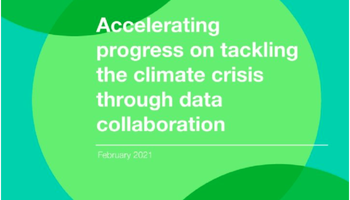
The EU Data Strategy has pushed data leaders across all sectors to consider new forms of data collaborations that create a single market for data for the benefit of businesses, researchers and public administrations.
Business leaders across the health, energy, and mobility sectors have already started working with stakeholders in their data ecosystem to launch data collaborations that address environmental, social, and business challenges.
Common European data spaces will ensure that more data becomes available for use in the economy and society, while keeping the companies and individuals who generate the data in control. The European Commission
Along with proposed data governance regulations, the Commission's data strategy includes investments in data-processing technologies and the opening up of high value public data sets.
Are you wondering how you can launch your data collaboration?
The value of data sharing for business
Industry leaders who have tested their approach to building new products and services, or addressing sector challenges through data-sharing initiatives, include:
Airbus launched the data collaboration APROCONE with its supply chain and research institution partners, with the purpose of sharing data to innovate aircraft design efficiently, and meet future environmental needs. The project had £19.2m of funding, and key stakeholders included the Centre for Modelling and Simulation (CFMS), GKN Aerospace, MSC Software, Rolls-Royce, and Cranfield University.
Greiner Packaging International (GPI), an Austrian packaging manufacturer, and Spanish logistics intelligence company OBUU, started a data collaboration to help monitor the resilience and efficiency of GPI’s supply chain. OBUU was able to identify a potential reduction of fixed asset investment of around 35%, resulting in a significant cost saving.
Barclays saw the benefits of being a leader in open banking early, when the legislation on the Second Payment Services Directive (PSD2) was implemented. PSD2 requires banks to implement standards that facilitate customers to share their data with other banking providers. Barclays went beyond the requirements and developed a pioneering consumer-focused data aggregation tool that allows its customers to view their accounts from as many as eight other banks within the existing Barclays mobile app.
PassivSystems uses automated meter reading (AMR) to monitor the performance of a portfolio of over 40,000 solar PV assets across the UK. They launched a data collaboration with Open Climate Fix to provide real-time energy demand forecasts and help UK Power Networks predict the supply and cost of maintaining the grid – which was estimated to cost £1bn a year in 2016.
What data leaders need to do to start a data collaboration
As a data leader, If you see the value in being aligned with and benefitting from the EU Strategy for Data, you will need to:
- Define your role in emerging European data spaces and in your sector’s data ecosystem
- Identify the challenges you want to address
- Assess the impacts of data access, use and sharing
- Scope and plan your data-sharing initiative
- Find the partners and communities you should engage
- Specify in your data strategy the organisational changes that collaborative data ecosystems require
- Develop a compelling vision for data collaborations in your sector, and advocate for change.
Develop your data collaboration ideas with help from the ODI
Excited about the potential for data spaces, but need a bit of guidance?
We help industry leaders identify opportunities and define their role in emerging European data spaces, guiding them towards data-sharing ecosystem designs with the potential to achieve ESG goals, and deliver environmental, social and business impact.
As an independent, vendor-neutral partner, we can help you map the route to impact that’s right for your industry and your priorities – guided by stakeholder and market needs, not technology solutions.
Book a call
Request a no-obligation 30-minute discovery call to get advice about taking your first steps towards launching a data collaboration (or progressing your current journey), informed by our practical experience and research-led insights.
